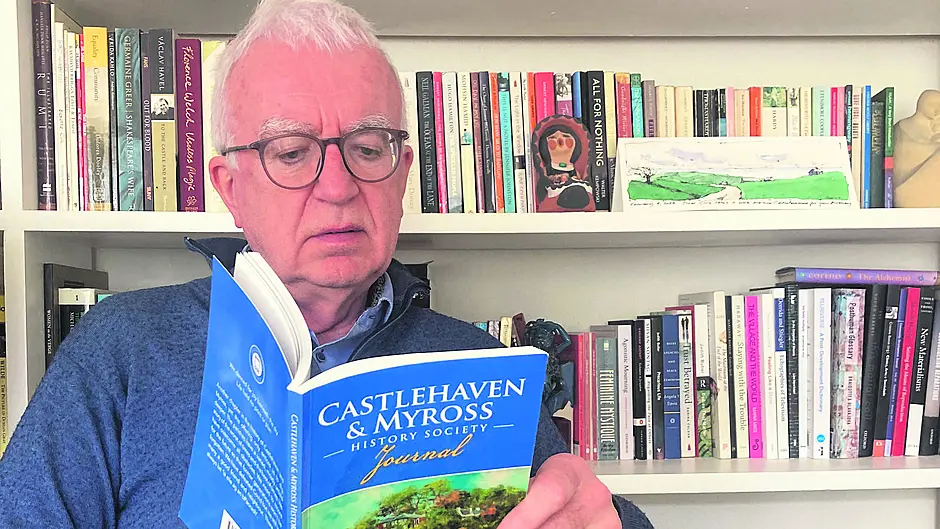In an ode to the local bookseller, of which West Cork has a plentiful supply, Peadar King says there is no better joy than having a good read within easy reach, when you tuck up at night
The Castlehaven & Moyross Historical Society Journal
has been my go-to introduction to West Cork. Now in its second edition, it’s been by my bed since its launch last year and when a short night-time read is required, I turn to it.
The most recent edition contains some irresistible titles such as The Toehead Wreckers, That Dam Christmas Cake and the extraordinary story of The Typhoid Outbreak in Castletownshend in 1920.
One contributor, equally new to the parish, has a five-book recommendation that includes Joseph O’Neill’s Blood Dark Track, a compelling read and one of my own favourite West Cork books.
If reading the quintessentially English Enid Blyton counts, then I have been a reader for as long as I can remember.
Her Englishness was the anthesis of my rural upbringing in West Clare. The Famous Five were four decidedly upper-class English children.
Earnest Julian, androgynous George, although I’m not so sure Blyton thought of her in such terms, stoical Dick and servile Anne.
And, of course, Timmy the dog. Twenty-five books in all.
I had no idea there were so many but research takes your columnist to interesting places. I also had to check on their favourite drink. I should have remembered. Ginger beer. They used to drink ‘lashings and lashings’ of it. I can only presume that it was of the non-alcoholic variety.
We never drank ginger beer in West Clare in the 1960s. I doubt if it were the drink of choice for most people here in West Cork, either. But then again, I’m an outsider and may be wide of the mark on this.
Eventually, I did wean myself off Enid Blyton. It wouldn’t have cut it in terms of street cred at boarding school in the early seventies.
What I remember from that time was reading a detective series, but now I cannot remember either the name of the author or any books in the series. I wish I could.
All I remember is wanting to get to the library after school to read the next phase in the investigation. It wasn’t Agatha Christie. That I know. I have never read anything by Agatha Christie. Maybe I had enough of English sensibilities after Enid Blyton.
By the time I got to my senior year in secondary school, all I wanted to read was Russian history. I remember hitching from Kilkee to O’Mahony’s independent bookshop in Limerick to buy a copy of Soviet dissident writer Aleksandr Solzhenitsyn’s The
First Circle. Solzhenitsyn, a former Red Army captain during the Second World War, later spent eight years in one of Stalin’s gulags. I struggled but persevered with it as I later
did with Tolstoy’s War and Peace. All of which came to mind on a later visit to Tolstoy’s house in the centre of Moscow.
One of the many joys of West Cork is the number of independent bookshops. Kinsale, Bandon, Clonakilty, Schull, Bantry. And it was in one such bookshop I picked up a slim hardcopy copy of Oscar Wilde’s De Profundis. The book itself is a work of art.
At 110 pages it is a one-sitting read, but I took my time. Apart from its contents, it felt good to read. The texture of the paper with its unevenly serrated pages made it a tactile read. Curiously, there is no date on the publication but the bookseller of West Cork estimated that it was most likely published in 1936. I am not a collector of books but I was happy to pay the equivalent of what I get paid to write this for it. It seemed a fair deal.
In 1895 Oscar Wilde was sentenced to two years’ hard labour, his gulag, for the crime of ‘gross indecency’ (read ‘homosexuality’). Near the end of his incarceration in Reading prison, he was to write his famous poem The Ballad of Reading Gaol. Shortly after his release, Wilde wrote De Profundis between January and March of 1897 as a letter to his lover Lord Alfred Douglas. The 55,000 word essay was never delivered to him. The copy (also by my bed) I have is only a portion of that letter.
Perhaps and not surprisingly, it is exquisitely written. Each sentence a work of art in itself, page-long choreographed sentences that occasionally run to over 100 words. (I once had an article returned to me with a note that that read: ‘nobody writes sentences with over 100 words.’ Clearly, some people can, and some people can do it beautifully).
De Profundis is a moving meditation on imprisonment and suffering.
‘Suffering is one long moment. It circles around one centre of pain. Out of my nature has come wild despair, bitterness and scorn, anguish that wept aloud, misery that could find no voice, sorrow that was dumb,’ Wilde wrote. ‘Outside, the day may be blue and gold, but the light that creeps down through the thickly-muffled glass of the small iron-barred window beneath which one sits is grey and niggard. It is always twilight in one’s cell as it is in one’s heart.’
To write like that. Hauntingly beautiful yet incredibly sad.
None of the above I would have been exposed to, thought about, written about, except for the presence of West Cork’s independent bookshops. Bookshops that inspire books by the bed.
For their presence, and for The Castlehaven & Moyross Historical Society Journal, I am grateful.









